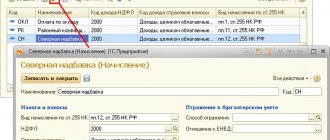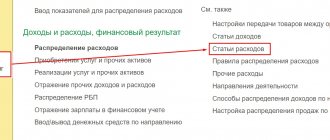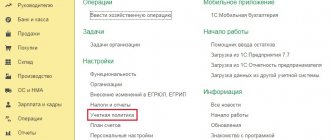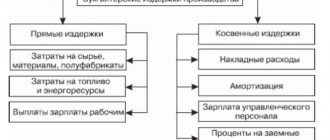What is recognized as expenses according to clause 1 of Art. 252 of the Tax Code of the Russian Federation?
Expenses are expenses or losses incurred by an enterprise in the course of its activities.
It should be noted that not all types of expenses can be deducted when calculating income tax. Firstly, they must meet the conditions given in paragraph 1 of Art. 252 of the Tax Code of the Russian Federation: this is expediency and documentary justification. Secondly, Art. 270 contains a list of costs that are not taken into account when reducing the tax base for income tax. For example, fines, penalties, contributions to the authorized capital of organizations, amounts of other taxes, expenses for the reconstruction of fixed assets (except for paragraph 9 of Article 258 of the Tax Code of the Russian Federation), etc.
Reflection of unreasonable expenses in accounting
Let's consider an example: an organization participates in a charity program by transferring contributions in the amount of 175,000.00 rubles. From the point of view of tax legislation, such expenses will be unjustified, since they do not lead to income (Article 270-16.34 of the Tax Code of the Russian Federation). An attempt to include them in the calculation of the tax base in order to reduce it may lead to the application of penalties against the organization.
In accounting, charitable contributions are reflected in account 91:
- Dt 91/2 Kt 76 - 175,000.00 rub. — reflects the amount of the charitable contribution.
- Dt 76 Kt - 51.50 - 175000.00 rub. — a charitable contribution is transferred.
- Dt 99/PNO Kt 68/Income tax - RUB 35,000.00. — a permanent tax liability is reflected (175,000.00*20%= 35,000.00).
Important! If an organization has incurred a loss as a result of its activities, this cannot serve as a basis for recognizing expenses as economically unjustified. Article 252 of the Tax Code of the Russian Federation does not justify costs based on the results of the activities of an economic entity. Likewise, costs aimed at reducing losses are justified (see letter of the Ministry of Finance No. 03-03-04/4/69 dated 10/27/05).
The determining factor is the focus on generating income, and not the result of economic activity during the period of expenditure.
Main
- The justification of expenses is determined by the organization.
- The expenses incurred must be primarily aimed at generating profit within the scope of the type of activity declared by the organization.
- Costs that do not meet this requirement, as well as those incurred in excess of the norms established by law, are economically unjustified. They cannot be included in tax calculations and reduce the tax base.
- Control of unreasonable expenses and expenses that may be recognized by the Federal Tax Service as unreasonable is carried out by the management of the organization.
- During a tax audit, the burden of proof of the unreasonableness of the taxpayer's expenses rests with the fiscal authorities.
How does Article 252 of the Tax Code of the Russian Federation group expenses?
There are many groupings of expenses: by areas, nature, types, costing items, accounting purposes (for example, for management or accounting).
To maintain tax records Art. 252 of the Tax Code of the Russian Federation establishes the following grouping of costs:
- Production costs and costs associated with the process of selling (selling) products.
- Expenses that are not included in the first point are non-operating costs.
Read about the principles on which this division is based in the material “Procedure and principles of accounting for income and expenses in an organization”
Budget classification of expenses
Expenses are classified according to several criteria:
- The functional classification reflects the direction of budget funds to perform the main functions of the state (administration, defense, etc.). (Section→ Subsection→ Target items→ Types of expenses).
- The departmental classification of budget expenditures is directly related to the management structure; it reflects the grouping of legal entities receiving budget funds. (Chief managers of budget funds).
- Economic classification shows the division of state expenditures into current and capital, as well as wages, material costs, and the purchase of goods and services. (Category of expenses→ Groups→ Subject items→ Subitems)
See also: Budget expenses
Functional classification of budget expenses
It is a grouping of budget expenditures at all levels of the budget system of the Russian Federation and reflects the expenditure of funds to perform the main functions of the state.
The functional classification of expenses has four levels: sections; subsections; target articles; types of expenses.
In particular, the functional classification provides for the following sections (Code - Name):
- 0100 – State administration and local government
- 0200 - Judicial branch
- 0300 – International activities
- 0400 - National Defense
- 0500 — Law enforcement and state security
- 0600 — Fundamental research and promotion of scientific and technological progress
- 0700 — Industry, energy and construction
- 0800 – Agriculture and fishing
- 0900 – Protection of the environment and natural resources, hydrometeorology, cartography and geodesy
- 1000 – Transport, road management, communications and computer science
- 1100 — Development of market infrastructure
- 1200 — Housing and communal services
- 1300 — Prevention and response to emergencies and natural disasters
- 1400 - Education
- 1500 – Culture, art and cinematography
- 1600 - Media
- 1700 – Health and physical education
- 1800 - Social policy
- 1900 - Service of public debt
- 2000 — Replenishment of state stocks and reserves
- 2100 -Financial assistance to budgets of other levels
- 2200 -Disposal and liquidation of weapons, including implementation of international treaties
- 2300 - Mobilization preparation of the economy
- 2400 -Exploration and use of outer space
- 3000 -Other expenses
- 3100 -Targeted budget funds
Further detailing of the functional classification of expenses is carried out by subsections, target items and types of expenses, for example:
| Type of detail | Code | Name |
| Chapter | State administration and local government | |
| Subsection | Functioning of the head of state - the President of the Russian Federation | |
| Target article | Contents of the President of the Russian Federation | |
| Type of expenses | Cash allowance of the President of the Russian Federation |
Based on the above functional classification, budgets of all levels are built. It is clear that the specifics of the budget at a particular level are taken into account. The functional classification is used in full for the federal budget.
Departmental classification of budget expenditures
Departmental classification of budgets is a grouping of expenses by recipients of budget funds. The list of recipients of funds from the federal budget is approved by law for the next year.
Departmental classifications of budgets of the subjects of the Federation and local budgets are approved by the authorities of the subjects of the Federation and local governments, respectively.
An example of a functional classification of expenses into 4 levels:
Economic classification of budget expenditures
The economic classification of budget expenditures is a grouping of budget expenditures at all levels of the budget system of the Russian Federation according to their economic content. It reflects the types of financial transactions carried out when government agencies perform their tasks. Economic classification includes groups, subgroups, subject items, subitems and expense elements.
The expense groups are:
| Code | Name |
| Current expenses are part of budget expenditures that ensure the current functioning of government bodies, budgetary institutions, etc. The category “Current expenses” includes the following groups: purchases of goods and services; interest payments; subsidies and current transfers; payment for services for recognition of property rights abroad. | |
| Capital expenditures are part of budget expenditures that support innovation and investment activities. A development budget may be allocated as part of capital expenditures. Capital expenditures have the following groups: capital investments in fixed assets, creation of state reserves and reserves, acquisition of land and intangible assets, capital transfers. | |
| Providing loans (budget loans) |
Further detail within the framework of economic qualification has the following structure:
| Type of detail | Code | Name |
| Group | Current expenses | |
| Subgroup | Purchase of goods and payment for services | |
| Subject article | Payment of utility services | |
| Sub-article | Payment for thermal energy consumption | |
| Cost element | Payment for heating and technological needs |
The economic classification of budget expenditures of the Russian Federation has been transformed into a classification of public sector operations. It determines the directions of budget revenues and expenditures, depending on the economic content of operations carried out in the public administration sector.
The classification of operations of the general government sector is a grouping of operations depending on their economic content.
Within this classification, general government sector operations are divided into current (revenues and expenses), investment (transactions with non-financial assets) and financial (transactions with financial assets and liabilities).
The classification of operations of the general government sector consists of the following groups:
- 100 Income;
- 200 Expenses;
- 300 Receipt of non-financial assets;
- 400 Disposal of non-financial assets;
- 500 Receipt of financial assets;
- 600 Disposal of financial assets;
- 700 Increase in liabilities;
- 800 Reduction of liabilities.
Groups are detailed by articles and subarticles. The more detailed analytical codes provided in this document are not general government transaction classification codes but are intended solely for the purpose of structuring the text of these Guidelines.
Classification of budget expenditures of the Russian Federation by public sector operations (Codes and names of articles and subarticles)
Budget classification codes (BCC) are not just a set of numbers, they are essentially a chart of accounts for accounting for income and expenses of the Russian budget. We offer you a brief description of the structure of the revenue code for tax revenues to the budget. The full version can be found in Order of the Ministry of Finance of Russia dated July 1, 2013 N 65n “On approval of the Instructions on the procedure for applying the budget classification of the Russian Federation”
What expenses are economically justified?
Costs that reduce taxable income must be justified from an economic point of view. This is stated in paragraph 1 of Art. 252 of the Tax Code of the Russian Federation. What do tax specialists understand by the economic justification of expenses?
There is a legislative gap on this issue today. Previously, the answer to this was contained in the Methodological Instructions for Chapter. 25 (order of the Ministry of Taxes and Duties of Russia dated December 20, 2002 No. BG-3-02/729, now inactive). Expedient and justified costs from an economic point of view, according to these guidelines, are costs that are aimed at generating income.
But since the above document has been cancelled, it would be reasonable for the company to consolidate the criteria for justifying expenses independently in its internal documents. Justification of expenses is one of the conditions for their recognition by the tax office.
Find out how recent judicial practice is developing on the application of Art. 252 of the Tax Code of the Russian Federation, available from the analytical selection from ConsultantPlus. If you don't have access to the system, get a free trial online.
Economically justified expenses
The economically justified cost method can be used in the field of water supply and sanitation, in the field of municipal solid waste management and in the field of heat supply.
Any expenses that are related to business activities, that is, incurred to generate income, are considered economically justified (Letter of the Ministry of Finance of Russia dated July 8, 2019 No. 03-03-06/1/50124). Unjustified expenses are expenses that do not comply with paragraph 1 of Art. 252 of the Tax Code of the Russian Federation (TC RF).
Any expenses are recognized as expenses, provided that they are incurred to generate income. It should be noted that the validity of expenses that are taken into account when calculating the tax base must be assessed taking into account the taxpayer’s intentions to obtain an economic benefit from business or other activities. Considering that tax legislation does not use the concept of economic feasibility and does not regulate the procedure and conditions for conducting financial and economic activities, the validity of expenses that reduce income received for tax purposes cannot be assessed from the point of view of their feasibility, rationality, efficiency or the result obtained. Therefore, according to the principle of freedom of economic activity, the taxpayer carries out it independently at his own risk and has the right to independently assess its effectiveness.
Justified expenses are economically justified expenses, the assessment of which is expressed in monetary form (clause 1 of Article 252 of the Tax Code of the Russian Federation). Economic justification is a frequent cause of disputes with tax authorities, who interpret this concept broadly. Expenses are recognized as justified and documented expenses (and in cases provided for in Article 265 of the Tax Code of the Russian Federation, losses) incurred by the taxpayer. These expenses are understood as economically justified expenses, the assessment of which is expressed in monetary form.
How to document expenses?
Art. 252 of the Tax Code of the Russian Federation establishes another condition for the recognition of expenses by tax inspectorates - this is their documentary justification.
Each expense transaction should be documented. At the same time, the execution of documents should not contradict the requirements of legislative acts of the Russian Federation. If an enterprise develops forms independently, then the documents must be drawn up in accordance with the provisions of its accounting policies.
Primary accounting documents are usually used to document costs:
- invoices;
- acts of acceptance of completed work;
- acts of acceptance and transfer of goods and materials;
- payroll statements for employees;
- money orders;
- contracts, etc.
A specific list of documents has not been established. However, they must confirm the expenses incurred and comply with the requirements of the legislation of our country.
For information on how to take into account the costs of services provided in special situations, see the material “When to take into account costs if services are provided in one period, and the documents for them are dated to the next?” .
What are production and selling expenses?
Production and sales costs are expenses directly related to the process of producing products and their further sale.
This group of expenses includes costs aimed at:
- for the production, storage, delivery and sale of products, for example, the purchase of raw materials, materials and necessary components;
- acquisition of fixed assets and maintaining their condition in proper form;
- development of natural resources;
- expenses for R&D, property insurance, etc.
They can be combined into 4 main subgroups:
- Material support for the production process.
- Payroll costs, including insurance premiums.
- Amounts of depreciation (depreciation) of fixed assets.
- Other expenses.
Depreciation of fixed assets is calculated in accordance with the procedure specified in Art. 256–259 Tax Code of the Russian Federation. For tax accounting, in contrast to accounting, only 2 types of depreciation of fixed assets are used: linear and nonlinear.
For a comparison of the principles of accounting and tax depreciation, read the article “Depreciation bonus in accounting and tax accounting.”
Article 252. Expenses. Grouping expenses
Article 252. Expenses. Grouping expenses
[Tax Code] [Tax Code of the Russian Federation, Part 2] [Section VIII] [Chapter 25]
. For the purposes of this chapter, the taxpayer reduces the income received by the amount of expenses incurred (except for the expenses specified in Article 270 of this Code).
Expenses are recognized as justified and documented expenses (and in cases provided for in Article 265 of this Code, losses) incurred (incurred) by the taxpayer.
Justified expenses mean economically justified expenses, the assessment of which is expressed in monetary form.
Documented expenses mean expenses confirmed by documents drawn up in accordance with the legislation of the Russian Federation, or documents drawn up in accordance with business customs applied in the foreign state in whose territory the corresponding expenses were made, and (or) documents indirectly confirming expenses incurred (including customs declaration, business trip order, travel documents, report on work performed in accordance with the contract). Any expenses are recognized as expenses, provided that they are incurred to carry out activities aimed at generating income.
. Expenses, depending on their nature, as well as the conditions for implementation and areas of activity of the taxpayer, are divided into expenses associated with production and sales, and non-operating expenses.
The paragraph has been deleted. — Federal Law of May 29, 2002 N 57-FZ.
2.1. For the purposes of this chapter, expenses of newly created and reorganized organizations are recognized as the value (residual value) of property, property and non-property rights with a monetary value, and (or) obligations received by way of succession during the reorganization of legal entities that were acquired (created) by the reorganized organizations before the date of completion of the reorganization. The value of property, property and non-property rights that have a monetary value is determined according to the data and tax accounting documents of the transferring party on the date of transfer of ownership of the specified property, property and non-property rights.
Expenses of newly created and reorganized organizations also include expenses (and in cases provided for by this Code, losses) provided for in Articles 255, 260 - 268, 275, 275.1, 279, 280, 283, 304, 318 - 320 of this chapter, incurred (incurred by ) by reorganized organizations in the part that was not taken into account by them when forming the tax base. For tax purposes, these expenses are taken into account by successor organizations in the manner and under the conditions provided for by this chapter. The composition of such expenses and their assessment are determined based on the data and tax accounting documents of the reorganized organizations as of the date of completion of the reorganization (the date of making a record of the termination of the activities of each merged legal entity - in the case of reorganization in the form of affiliation).
Additional expenses associated with the transfer (receipt) of property (property and non-property rights) during the reorganization of organizations are taken into account for tax purposes in the manner established by this chapter.
. The specifics of determining expenses recognized for tax purposes for certain categories of taxpayers or expenses incurred in connection with special circumstances are established by the provisions of this chapter.
. If some expenses can be assigned simultaneously to several groups of expenses with equal grounds, the taxpayer has the right to independently determine which group he will assign such expenses to.
. Expenses incurred by the taxpayer, the cost of which is expressed in foreign currency, are taken into account in conjunction with expenses, the cost of which is expressed in rubles.
Expenses incurred by the taxpayer, the cost of which is expressed in conventional units, are taken into account in conjunction with expenses, the cost of which is expressed in rubles.
Recalculation of these expenses is carried out by the taxpayer depending on the method of recognition of such expenses chosen in the accounting policy for tax purposes in accordance with Articles 272, 273 of this Code.
For the purposes of this chapter, amounts reflected in the taxpayer's expenses are not subject to re-inclusion in the taxpayer's expenses.
What is recognized as non-operating costs?
Non-operating costs are expenses that are not directly related to the production process and its sale. They must also be substantiated and have documentary evidence.
Such costs should, for example, include:
- maintenance of leased property, including leasing;
- issue of securities;
- negative exchange rate differences;
- write-off of worn-out fixed assets, intangible assets, etc. (Article 265 of the Tax Code of the Russian Federation);
- losses from previous periods, doubtful debts not covered by the reserve.
Article-by-article comments to Art. 252 of the Tax Code of the Russian Federation with answers to the most complex questions regarding the application of the article, see ConsultantPlus. Learn the material by getting trial access to the system for free.
What to do if expenses belong to several groups at the same time?
In practice, situations often arise when the same expense item can be included in several groups at the same time. In this case, the Tax Code provides the taxpayer with the opportunity to make his own decision (clause 4 of Article 252 of the Tax Code of the Russian Federation). The enterprise has the right to classify such “controversial” types of expenses into those groups that it considers to be a more correct option.
In order to avoid controversial situations with tax inspectorates, items, types of costs, and their grouping must be fixed in the accounting policy for tax accounting. Depending on the type of activity, each enterprise may have its own cost items. But their definition and grouping should not contradict the current tax legislation.
Classification of organizational expenses by nature of activity
Depending on the type, nature and circumstances of the activity, the organization’s costs in accounting are divided into:
- expenses incurred in the course of normal (main) activities;
- other expenses.
What types of expenses exist in income tax accounting ?
The first option includes costs during the manufacture and sale of a product, for the provision of services and performance of work, for the purchase of a product and its sale, for mandatory transfers (tax, extra-budgetary funds), and for management costs.
Question: What type of expenses for income tax purposes include transportation costs if goods are sent in transit to the buyer (Article 320 of the Tax Code of the Russian Federation)? View answer
The second includes other expenses that are not directly related to the main activities of the company and are not taken into account in the expense accounts intended for production.
Costs taken into account for tax purposes are divided into those related to the production/sale of the product and non-sales expenses.
Depending on the classification of expenses by type of activity, the enterprise generates profit and loss statements, determined as the difference between proceeds from the sale of a product and its cost. Therefore, further classification of expenses is presented by type for:
- calculating the cost of the product;
- preparation of decisions, including management ones;
- control, regulation.
What type of expenses does the depreciation bonus belong to (Clause 1, Article 318 of the Tax Code of the Russian Federation) ?
How to account for expenses in foreign currency?
Expenses incurred in foreign currency (conventional monetary units) are included in the total amount of expenses expressed in rubles. Such expenses must be converted into rubles at the official foreign currency exchange rate on the day they were recognized and accepted for tax accounting (clause 10 of Article 272 of the Tax Code of the Russian Federation).
Sources: Tax Code of the Russian Federation
You can find more complete information on the topic in ConsultantPlus. Free trial access to the system for 2 days.





